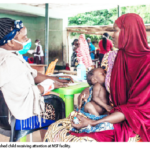Alarming Study Reveals 13.4 Million Premature Births Worldwide in 2020

A groundbreaking study published in The Lancet has unveiled a deeply concerning global health issue: an estimated 13.4 million babies were born prematurely in the year 2020, equating to one in ten infants worldwide being born before the completion of 37 full weeks of pregnancy. The study, conducted by experts from the World Health Organisation (WHO), the United Nations Children’s Fund (UNICEF), and the London School of Hygiene and Tropical Medicine, sheds light on the devastating implications of premature births and underscores the pivotal role of maternal health and nutrition in addressing this critical concern.
Preterm Births: A Global Challenge
High Prevalence and Dire Consequences
The study emphasizes the severe consequences of preterm births on the health and survival of newborns, lamenting the significant impact on their well-being. Poor maternal health and malnutrition were identified as contributing factors to the high prevalence of preterm births, which have emerged as a leading cause of mortality during early childhood.
Long-Term Ramifications
Furthermore, the study reveals that surviving preterm births can lead to a myriad of challenges, including major illnesses, disabilities, developmental delays, and even chronic diseases such as diabetes and heart conditions later in life.
A Disturbing Global Trend
Stagnation in Progress
Despite ongoing efforts to improve maternal health and reduce the prevalence of preterm births, the study highlights a disheartening reality: no region across the globe has made significant strides in reducing preterm birth rates over the past decade. The annual global rate of reduction in preterm births between 2010 and 2020 was a mere 0.14 percent.
Call for Urgent Action
Expert Perspective
Responding to these alarming findings, Dr. Anshu Banerjee, Director of Maternal, Newborn, Child and Adolescent Health and Ageing at WHO, emphasizes the urgent need for enhanced investment in support services for preterm babies and their families. He calls for a renewed focus on preventive measures, particularly ensuring access to high-quality healthcare before and during pregnancies.
read reducing preterm babies death
Global Disparities in Preterm Births
Regional Disparities
The study also unveils significant disparities in preterm birth rates across regions and countries. Approximately 65 percent of preterm births in 2020 occurred in sub-Saharan Africa and southern Asia, where over 13 percent of babies were born prematurely.
Country-Specific Variation
The countries most severely affected by preterm births included Bangladesh (16.2 percent), Malawi (14.5 percent), and Pakistan (14.3 percent), with rates three to four times higher than those in the least affected countries like Serbia (3.8 percent), Moldova (4 percent), and Kazakhstan (4.7 percent).
A Global Challenge
The issue of preterm births is not confined to low and middle-income countries. The study underscores that it affects families in all corners of the world, with some high-income countries, such as Greece (11.6 percent) and the United States of America (10 percent), grappling with high preterm birth rates.
Addressing the Root Causes
Maternal Health Risks
The study identifies several maternal health risks closely linked to preterm births, including adolescent pregnancy, infections, poor nutrition, and pre-eclampsia. Additionally, it emphasizes the critical role of quality antenatal care in detecting and managing complications, ensuring accurate pregnancy dating through early ultrasound scans, and employing approved treatments to delay labor when necessary.

Conclusion
This comprehensive study serves as a wake-up call to the global community, highlighting the urgency of addressing preterm births as a pressing public health issue. By prioritizing maternal health, nutrition, and access to quality healthcare, we can take significant strides toward reducing the prevalence of preterm births and safeguarding the health and future of newborns worldwide.




